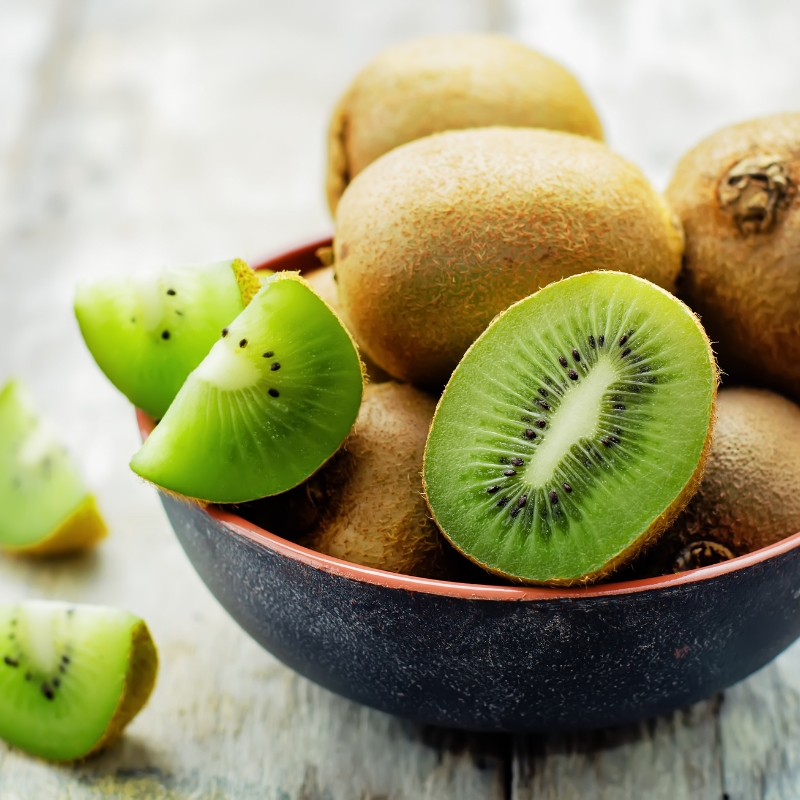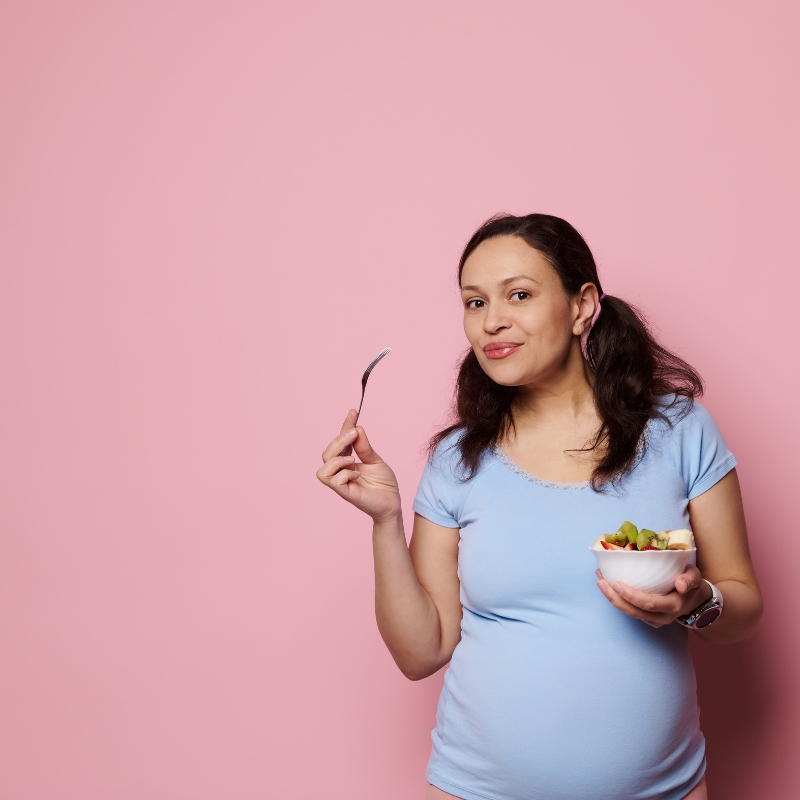During pregnancy, maintaining a balanced diet is crucial for the health and development of both mother and baby.
Among the variety of fruits available, kiwi stands out as a superfood packed with essential nutrients. But is it safe to consume kiwi during pregnancy, and how can it benefit expectant mothers?

Let’s explore.
Nutritional Value of Kiwi
Kiwi is a nutrient powerhouse, making it an excellent choice for pregnant women. Here is the nutritional breakdown per 100g of kiwi:
| Nutrient | Amount |
|---|---|
| Vitamin C | 92.7 mg |
| Folate | 31 μg |
| Fiber | 2.1 g |
| Potassium | 312 mg |
| Antioxidants | High |
This fruit is low in calories and high in water content, making it a refreshing and healthy snack.
Benefits of Eating Kiwi during Pregnancy
1. Supports Fetal Development
Kiwi is a rich source of folate, a vital nutrient for preventing neural tube defects in babies. Regular consumption of kiwi ensures adequate folate levels, supporting healthy fetal development.
2. Enhances Immunity
Vitamin C in kiwi helps boost the immune system, protecting both the mother and baby from infections and illnesses.
3. Improves Digestion
The high fiber content in kiwi aids in digestion, helping to prevent constipation, a common concern during pregnancy.
4. Promotes Iron Absorption
Vitamin C enhances the absorption of iron from other foods, ensuring the mother’s blood can carry enough oxygen to her baby.
5. Regulates Blood Pressure
Potassium in kiwi helps maintain healthy blood pressure levels, reducing the risk of pregnancy-induced hypertension.
Is Kiwi Safe During Pregnancy?

Yes, kiwi is safe to eat during pregnancy for most women. However, those with a kiwi allergy or oral allergy syndrome should avoid it. It is also essential to wash the fruit thoroughly to eliminate any risk of contamination.
How Much Kiwi Should You Eat?
Moderation is key. Consuming 1–2 kiwis per day is generally safe and beneficial. This amount provides essential nutrients without the risk of overconsumption, which might lead to digestive discomfort due to its natural laxative effect.
Potential Risks and Precautions
1. Allergies
Some individuals may experience an allergic reaction to kiwi, characterized by itching, swelling, or difficulty breathing. If you notice any of these symptoms, consult a doctor immediately.
2. Natural Laxative Effect
Kiwi contains actinidin, an enzyme that can act as a natural laxative. While beneficial for digestion, excessive consumption might lead to diarrhea or discomfort.
Genetic and Molecular Risk Factors
Recent research highlights a rise in certain food allergies, including kiwi allergies.
While genetic factors alone may not explain this trend, there are genetic predispositions to developing food allergies, much like asthma or eczema.
Future studies aim to determine whether genetic polymorphisms linked to these conditions are also associated with food allergies (Source).
How to Include Kiwi in Your Pregnancy Diet?
Adding kiwi to your diet can be fun and delicious. Here are some simple ideas:
- Smoothies: Blend kiwi with bananas and yogurt for a refreshing drink.
- Salads: Mix kiwi slices with spinach, nuts, and a light vinaigrette.
- Breakfast Bowl: Top oatmeal or yogurt with kiwi and berries for a nutrient-rich start to your day.
- Mocktails: Create a non-alcoholic kiwi mojito with fresh mint and lime.
Bonus Resource:
For a more detailed guide on pregnancy-friendly recipes featuring kiwi, download this helpful PDF filled with easy-to-make dishes that prioritize your health and your baby’s development.
5 Tips for Pairing Kiwi with High-Iron Foods to Maximize Iron Absorption
Kiwi’s high vitamin C content makes it an excellent companion for iron-rich foods, helping your body absorb more iron effectively. Try these combinations:
- Spinach Kiwi Salad: Toss fresh spinach, sliced kiwi, and nuts together with a light dressing for a nutritious meal.
- Kiwi and Lentil Curry: Add diced kiwi to your lentil curry just before serving for a unique flavor boost.
- Iron-Fortified Breakfast: Pair your iron-fortified cereal or oatmeal with a side of fresh kiwi slices.
- Quinoa Kiwi Bowl: Mix cooked quinoa with kiwi chunks, dried fruits, and a drizzle of honey for a balanced meal.
- Kiwi and Chickpea Wraps: Add kiwi slices to chickpea wraps or hummus-based dishes to enhance both flavor and iron absorption.
These tips not only boost iron levels but also diversify your pregnancy diet with flavorful, nutrient-packed options.
Frequently Asked Questions About Kiwi and Pregnancy
Yes, Kiwi fruit is absolutely safe to eat at night during pregnancy. In fact, it can be a great option as it is rich in vitamins and minerals that promote a healthy pregnancy. The natural sugars in Kiwi are not harmful, and its high fiber content can also aid digestion and help you feel more comfortable before bed.
Kiwi is not high in sugar compared to many other fruits. It has a low glycemic index, which means it doesn’t cause a rapid spike in blood sugar levels. It’s packed with essential nutrients like vitamin C, fiber, and antioxidants, making it a healthy choice for pregnancy and beyond without worrying about excess sugar.
Yes, Kiwi is an excellent fruit to consume after delivery. It’s packed with vitamin C, which helps with tissue repair and boosts immunity. Kiwi also aids digestion, which can be helpful during postpartum recovery. The fiber in Kiwi can help prevent constipation, a common issue after childbirth.
Kiwi can be a beneficial fruit after a miscarriage. It’s rich in antioxidants, vitamin C, and folate, which support recovery and overall health. While it’s important to follow your doctor’s advice regarding nutrition after a miscarriage, Kiwi can certainly be a part of a nutrient-rich diet to help your body heal.
Kiwi Crush can be safe in pregnancy, but it’s essential to ensure that it doesn’t contain added sugars or artificial ingredients. I recommend consuming fresh Kiwi or freshly made juice to get the most nutrients without unnecessary additives. Always check the label or opt for natural, homemade versions to ensure it’s a healthy option during pregnancy.
About Me, Dr. Aprajita Srivastava

I am a highly experienced IVF specialist based in Noida, as well as a renowned gynecologist, obstetrician, and reproductive endocrinologist.
With my extensive expertise, I guide expectant mothers in making informed dietary and lifestyle choices to ensure a healthy pregnancy.
I believe in a holistic approach to maternal care, emphasizing the importance of nutrition.
For this reason, I often recommend incorporating kiwi and other nutrient-rich foods as valuable parts of pregnancy wellness.
Conclusion
Kiwi is a nutrient-dense and safe fruit that offers numerous health benefits for pregnant women.
From supporting fetal development to enhancing digestion and immunity, it’s a valuable addition to a pregnancy diet. However, moderation and proper preparation are key.
